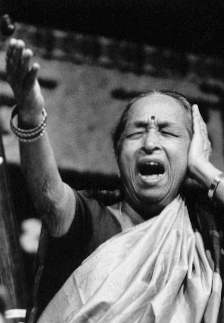The legendary Indian Classical singer Gangubai Hangal passed away this morning at the age of 96. Her passing is one more sorrowful step towards the end of an era which I was fortunate to experience in its final decades. This was an era where the grand art and tradition of Indian Classical ("Hindustani") music was practised by people of a certain calibre, dedication and - how else to say it - solidity. These were people for whom fame and money were by-products. Gangubai also pursued her career defying the prevailing prejudice against a woman pursuing a musical career (she may have been helped by the fact that her mother was herself a vocalist).
I had the good fortune to attend several of her concerts during the 1980's and 90's. Two of them were at my alma mater St Xavier's College in Bombay. They have an open-air music festival in January which, on the final day, would continue through the night (I think this feature has recently been discontinued). I remember once hearing her sing Raga Chandrakauns under a brilliant moon around midnight. A magical experience. Another time, or perhaps on the same occasion, my friend Vishwanath and I were chatting at the side of the stage after her concert when she passed us on her way out. She sent a truly charming smile in our general direction, leaving each one of us convinced we had been the recipient.
Gangubai trained under the legendary Kirana Gharana musician Sawai Gandharva and was therefore the "guru-behen" of Bhimsen Joshi and Firoz Dastur among many others. She had a rather masculine voice which was instantly identifiable. Gangubai's daughter Krishna Hangal was also an excellent musician, with a more feminine voice that resonated like silver. Born when her mother was just 16, Krishna - who died five years ago at the age of 75 - was her constant companion at concerts and they came across more like sisters than like a mother-daughter duo.
The hallmark of Kirana singing is the purity of the note, and here I feel Gangubai excelled over all her peers. Strangely enough her concerts, and even studio recordings, tended to start on a meandering and very unpromising note. Her first "saa" (enunciation of the tonic of the scale) would be anything but precise, in fact it would wobble like a boat about to sink and one would wonder how things were going to go. But after a minute or so of this wobbling, the boat would slowly gather a bit of speed and steady itself. Her recital of the composition would bring out the words very affectionately (one of my favourites, in Raga Bhimpalasi, is the Sadarang composition "Garava harava daarungi main"). And now the steamship would gather more speed and start to really slice through the waves. Here the Kirana ambition would come to the fore and every "taan" would end on a high note with the sharpness of a titanium knife-edge.
Before hitting one of these notes Gangubai would, in a characteristic gesture, cup her left ear. Perhaps it helped her experience the resonance better. And now a particular event comes to mind. In the 1980's I had gone with Vishwanath and another friend, Aravinda, to Birla Matushri Sabhaghar, near Chowpatty, where Gangubai sang Raga Shuddh Kalyan. I recall we had dropped in on the concert spontaneously and without any advance planning. And once she really got going and started hitting the pure notes, the event happened. One palm over her left ear, she hit a note with such force that she surprised herself! Then she gave a sweet, childlike smile as if to say "did I really do that?". All three of us noticed it independently.
Now the wonderful smile is gone and another pure spirit lost to the world. Fortunately we are left with a number of her recordings, as well as this 79-minute youtube video (an error in the link has now been corrected).
